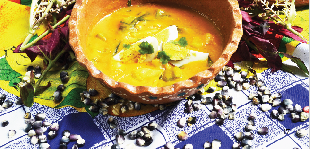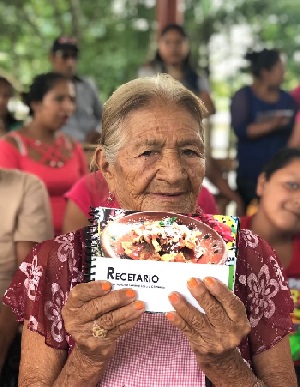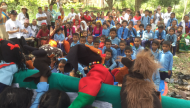Mexico: Indigenous cookbook to raise pride among community members

A new indigenous cookbook is changing Cardenas community's women's beliefs and perceptions about what it means to embrace and protect their traditions.
In southern Mexico, words like chipilín, chayote, yerba santa, and maize (leafy green, mirliton squash, sacred herb, and corn) used to convey poverty. But for the 200 women of the Cardenas community within Chiapas state’s Cintalapa municipality, they now conjure feelings of pride.
These fruits and herbs, endemic to southern Mexico, have historically formed an essential part of traditional diets in the small farming village. Growing and eating these traditional foods grown in their backyards had become undesirable, recognized among locals as merely a “poor person’s access to food.” But an indigenous cookbook is changing the women’s beliefs and perceptions about what it means to embrace and preserve their traditions.
“I am 93 years old. Sharing my recipe is the most beautiful thing that has happened to me.” - Consuelo Santos Cruz
 The cookbook, produced in early 2019 and titled “Recetario Colonia Agrícola General Lázaro Cárdenas” (Recipe Book for the Cardenas community), comprises 48 recipes, each submitted by a community member. Created by and for the community, the first of its kind cookbook serves many purposes.
The cookbook, produced in early 2019 and titled “Recetario Colonia Agrícola General Lázaro Cárdenas” (Recipe Book for the Cardenas community), comprises 48 recipes, each submitted by a community member. Created by and for the community, the first of its kind cookbook serves many purposes.
It’s a resource that promotes traditional and typical cooking methods, ingredients, and dishes—recipes that had been in their families for various generations but weren’t being passed down to younger generations. It’s a physical manifestation of pride in one’s cultural heritage, as each recipe lists its author, and spotlights indigenous crops. And it’s a visual tool that normalizes the use of agroecology and native seeds within the community and starts a dialogue among smallholder farmers around using more sustainable agricultural practices.
“Chipilín mole is traditional in our town. I felt proud to see it in the recipe book. I felt just like a professional chef.” - Aurora Gálvez Cruz
The cookbook was the brainchild of the Mexican nonprofit Desarollo Alternativo e Investigación A.C. (DAI). DAI’s mission is to improve the lives and the soil of indigenous and non-indigenous people in Chiapas state by promoting and cultivating its traditional agricultural system, milpa—a mixed crop of maize, beans, and squash—and diversifying its crops. And DAI aims to support use of traditional knowledge to promote rural development, gender equity, bio-cultural diversity conservation, and sustainable management of agroecosystems.
DAI Executive Director Kevin Ferrara, who won the Food Security & Nutrition Impact award from Rare’s 2017 Solution Search: Farming for Biodiversity competition, encourages farmers from Cárdenas to increase backyard milpa production. This approach results in better family incomes, food security, and food sovereignty for Cardenas and other farming communities in Chiapas. For DAI, Cardenas’ residents can prosper if they shift to using agroecology and native seeds and learn to embrace their traditional methods.
“The smallholder farmers often have only one hectare to come up with good strategies to fulfill household needs. There is massive potential in the local and traditional knowledge systems, such as backyard production, that we can use to tackle these challenges.”
Local and indigenous knowledge systems provide a foundation for locally appropriate sustainable development. Applying traditional knowledge to smallholder farming can contribute to improving access to local food and livelihood security in areas such as Cardenas. Both FAO and the 2019 IPBES Global Assessment Report on Biodiversity and Ecosystem Services recognize that indigenous communities play a fundamental role in safeguarding biodiversity, enhancing food security, fighting poverty and hunger and promoting sustainable agriculture practices. Agroecology itself directly contributes to some of the most significant Sustainable Development Goals.
Through the Solution Search award, which surfaced promising solutions like DAI’s that could benefit from incorporating behavioral insights, and a subsequent Campaigning for Conservation training that taught DAI how to develop and implement a social marketing campaign, Kevin finally understood that just teaching farmers about using indigenous crops, agroecology, and native seeds wouldn’t help to accomplish DAI’s mission—he had to understand the barriers and motivations to help farm households adopt more resilient seed systems.
Armed with these new insights, Kevin formed a campaign to inspire pride among Cardenas’ farmers about native seeds in their backyards and elevate women’s roles as champions and heroes of native seed cultivation. DAI has now printed 65 cookbooks for the community and has fielded requests to publicize and share the cookbook in San Cristobal de las Casas, one of the biggest cities in Chiapas. The women are already planning a second cookbook with new recipes to share.
For Kevin, seeing how the cookbook has stimulated pride in local and indigenous agriculture motivates him to focus future campaigns on inspiring pride and spreading domestic demand for traditional seeds and farming techniques across Mexico. DAI is advancing additional campaigns in four communities, engaging 634 farm households in agroecology and seed dissemination, and training local youth to support farm households.
The link has been copied to the clipboard
Contact
IKI Office
Zukunft – Umwelt – Gesellschaft (ZUG) gGmbH
Stresemannstraße 69-71
10963 Berlin
Publication
Cookbook with traditional Mexican dishes (Spanisch)
<link https: www.international-climate-initiative.com en infotheque publications publication article indigenous_cookbook_with_traditional_mexican_recipies external-link-new-window>Download
Related Publications
-
-

-
10/ 2019 | Guideline
Indigenous cookbook with traditional Mexican recipies
Spanisch | Spanish (PDF, 70 MB)







![[Translate to English:] Two hands holding two different sized seeds](/legacy/_processed_/8/8/csm_200528_Sustainable_Seeds_1_9522e50bf5.jpg)


![[Translate to English:] Dr. Elsa Nickel, Ministerialdirektorin im BMUB; Foto: ©GIZ/Wolter](/legacy/_processed_/e/e/csm_171116_GIZ_PA_0067_Elsa_Nickel_BMUB_310_53e5a7828c.jpg)



